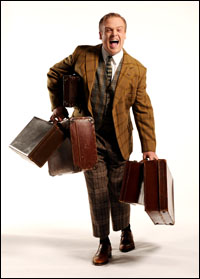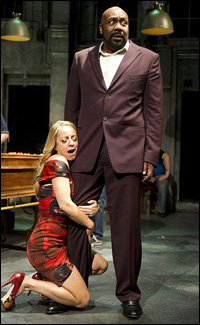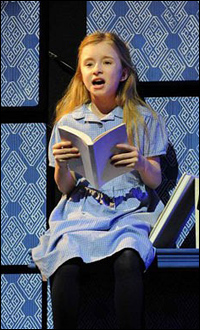
*
Sometimes I just know I'm a spoiled brat. I get to go to the theatre every night, something many fans dream about. Often, if I'm not writing an overnight review for publication the following morning, I get to go out to dinner after the show as well. Recent British surveys among various demographic groups indicate that most people's ideal evening is to go out to dinner in a restaurant, followed by a West End play or musical. Me? I'd just love an evening of bad television while eating a carry-out Chinese meal. That's a consequence of seeing five shows a week, 48 weeks a year (the other weeks I'm in New York, seeing, you've guessed it, five NYC shows a week) and coming to the end of the year a bedraggled wisp of a woman who has seen too much. Theatrically speaking, that is.
Before I disappear into a welter of my own self pity I should perhaps share what I've been seeing recently on the London stage. Because some of it is truly marvelous and I'm aware, believe me, of my privileged position in being able to see it all. One of the oddities of the season is that we currently have not one, not two, but three great farces on our boards. Farce is, in some ways, the most difficult theatrical form to bring off, relying as it always does, on split-second timing, perfect casting and direction of the highest order. And we've got three, one of which will be arriving on American shores in April with its original lead for Broadway, while continuing to play London with a second cast. That one is One Man, Two Guvnors, a breathtaking tour de force for its young leading man, James Corden. Corden, one of the original History Boys, was previously best known as a comedian who also starred in a television sitcom, "Gavin & Stacey." Nobody knew he could take and carry an entire big-cast West End show and bring down the house every night. Because he was such a revelation to London critics and theatregoers, we're willing to give a sporting chance to his successor in the role, Owain Arthur, a complete unknown who takes over from Corden when he leaves for New York.
 |
||
| Owain Arthur |
||
| photo by Hugo Glendinning |
Michael Frayn's Noises Off, originally performed in 1982 in London, Broadway and then throughout the world, is possibly the most meticulously crafted farce in theatrical history, simultaneously playing a farce while parodying it and parodying it while sending it up. Its production has to be a kind of ballet, its choreography flawless, and its timing impeccable. In addition, it needs a cast which not only understands the form but is willing to play with it while taking it seriously, and a director who is fearless. At the Old Vic, all these come together and it is one of the most satisfying theatrical evenings currently playing in London. Even if you saw it first time around, see it again in its current incarnation. You won't be disappointed. A big surprise in the hit stakes is the first stage adaptation of a creaky old Ealing Studios comedy film, The Ladykillers, at the Gielgud. Fine ensemble playing from a first-rate cast brings this soppy story to a hilarious boil every night. It concerns an elderly lady who rents out rooms in her ramshackle London house to a gang of thieves and murderers who manage to convince her that they're a classical music ensemble. Audience members were literally choking with laughter the night I saw it. I kept dropping my program on the floor as, I too, enjoyed the fun. A fabulous set by Michael Taylor is so significant to the production that it seemed to be another member of the cast, so perfectly did it work into the action. In the 1955 movie Alec Guiness as a sinister "Professor," the gang leader, led the cast of actors which included Peter Sellers as the youngest of the crooks but, without giving ground to anyone, Peter Capaldi in the same role has eliminated the memory of Guiness while taking his measured place in a new cast of astonishing range and intricate attention to detail. The director, Sean Foley, is the ringmaster for all the attendant mayhem and the audience leaves the theatre exhausted from laughing.
 |
||
| Claudie Blakley and Lenny Henry in The Comedy Of Errors. |
||
| photo by Tristram Kenton |
 |
||
| Kerry Ingram in Matilda. |
||
| photo by Alastair Muir |
A footnote on this musicals section: Pippin has hit town again. It appears in a new production at the Menier Chocolate Factory, that petite hotbed of American musical revivals which gave rise to the international productions of Sunday in the Park With George, A Little Night Music, La Cage aux Folles, etc. Menier is no neophyte when it comes to rediscovering the essence of great shows. Pippin's designs place the show inside a video game, a conceit which will be recognizable to any boy who loves computers. What strikes me is the extent to which Pippin is, in a way, the other half of Wicked, not coincidentally also by Stephen Schwartz. If Wicked is the perfect show for pre-pubescent girls, so this version of Pippin is perfect for boys of the same age. The love interest is peripheral and stuffed into the last third of the show so as not to upset boys who aren't yet interested in girls, and the choreography — a hybrid of new work and pick-ups from Bob Fosse at his genius best — is well integrated into the fast-moving modernistic images. This production, unusually for the Menier, is undercast but a zippy American cast could solve that problem. Perhaps this one will cross the Atlantic, allowing Broadway to see yet again what a fine show-maker Schwartz (Godspell) is. He knows just what to do to make musicals work, and his craft is a joy to see. He is one of the most successful, and most underrated, professionals in the theatre.
It's been a bit thin on the new plays scene recently if you don't count Neil LaBute's Reasons to be Pretty (which was at least new to London in a spiffy production by Michael Attenborough, who has become something of a LaBute specialist at the Almeida) and, at Trafalgar Studios, a haunting meditation by Tim Price on life, suicide, depression and sisterly love called Salt, Root and Roe, which is stunningly well acted but so sad as to be almost unbearable to watch.
There's a revival of Marie Jones' Stones in his Pockets at the Tricycle which focuses not on the humor which was the core of the play in its first productions here and in New York but on the darkness. Jones describes it as "a drama about the disintegration of a rural community and the tragedy that brings to its people." Ah, well, I enjoyed it more the first time around when it was funnier, but I see her point. And while we're on Ireland and the Irish, the National's co-production with the Abbey Theatre, Dublin, of Sean O'Casey's masterpiece, Juno and the Paycock boasts a massively accomplished all-Irish cast headed by Sinéad Cusack and Ciarán Hinds. And now I'm off to watch "Grey's Anatomy" with some Kung Pao Chicken for company. You can see why.
(Ruth Leon is a London and New York City arts writer and critic whose work has been seen in Playbill magazine and other publications.)
*
Check out more of Playbill.com's international coverage, including London correspondent Mark Shenton's daily news reporting.









